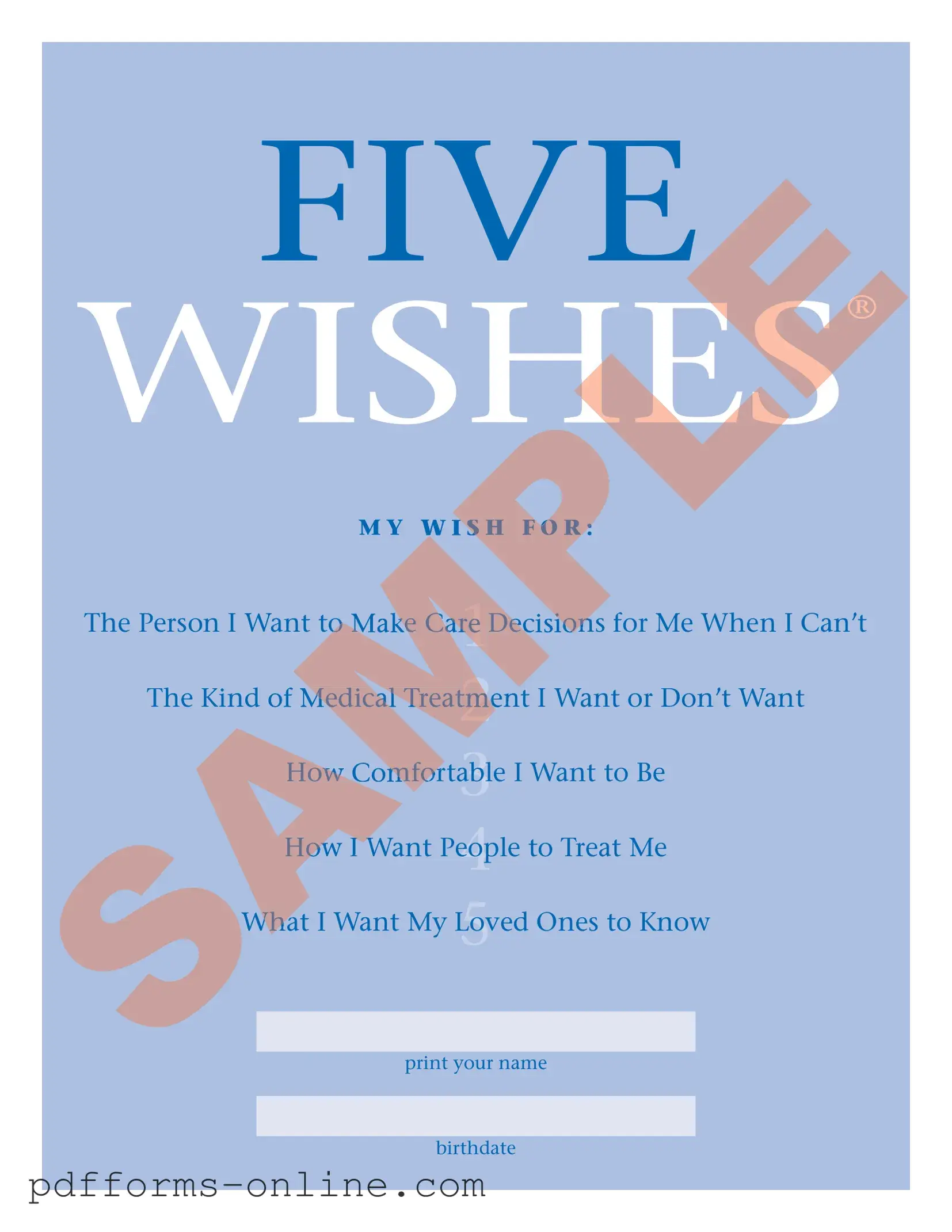Blank 5 Wishes Document Template
In a world filled with uncertainties, having a plan for the unexpected can provide peace of mind. The Five Wishes document is a unique tool that empowers individuals to express their medical, emotional, and spiritual preferences in times of serious illness. This form allows you to designate a trusted person to make healthcare decisions on your behalf when you may no longer be able to do so. It goes beyond traditional living wills by addressing not only medical treatments but also how you wish to be treated and what you want your loved ones to know. With simple checkboxes and open-ended questions, completing the Five Wishes document is straightforward, making it accessible for everyone aged 18 and older. Once signed, it holds legal validity in most states, ensuring that your wishes are honored. This document encourages open conversations with family and friends, alleviating the burden of making tough decisions during difficult times. Developed with insights from legal and healthcare experts, Five Wishes has gained recognition as a compassionate approach to advance care planning, helping millions navigate the complexities of end-of-life care.
Document Example

FIVE
WISH S®
M Y W I S H F O R :
The Person I Want too Make Car1e Decisions for Me When I Can’t
The Kind of Medical Treat2ment I Want or Don’t Want
How Comfortable3 I Want to Be
How I Want People4 to Treat Me
What I Want My Loved5 Ones to Know
print your name
birthdate

Five Wishes
There are many things in life that are out of our hands. This Five Wishes document gives you a way to control somethingg very
What Is Five Wishes?
Five Wishes is the first living will that talks about your personal, emotional and spiritual needs as well as your medical wishes. It lets you choose the person you want to make health care decisions for you if you are not able to make them for yourselff. Five Wishes
lets you say exactly how you wish to be
treated if you get seriously ill. It was written with the help of The American Bar
$VVRFLDWLRQ·V&RPPLVVLRQRQ/DZDQG$JLQJ DQGWKHQDWLRQ·VOHDGLQJH[SHUWVLQHQGRIOLIH FDUH,W·VDOVRHDV\WRXVH$OO\RXKDYHWRGRLV check a box, circle a direction, or write a few
sentences.
How Five Wishes Can Help You And Your Family
• |
It lets |
you talk with your family, |
|
|
WKH\ZRQ·WKDYHWRPDNHKDUGFKRLFHV |
|||||||||
|
|
frie |
|
|
|
|
|
|
|
|
|
without knowing your wishes. |
||
|
|
nds and doctor about how you |
||||||||||||
|
|
wantt |
|
|
|
|
|
|
|
|
||||
|
|
to be treated if you become |
• You can know what your mom, dad, |
|||||||||||
|
|
seriou |
|
|
|
|
|
|
|
|||||
|
|
sly ill. |
|
|
|
|
spouse, or friend wants. You can be |
|||||||
• |
|
Your family membe |
rs will not have to |
|||||||||||
|
there for them when they need you |
|||||||||||||
|
|
|
|
|
t. It protects them |
most. You will understand what they |
||||||||
|
|
guess what you wan |
||||||||||||
|
|
|
ously ill, because |
really want. |
||||||||||
|
|
if you become seri |
||||||||||||
How Five Wishes Began
For 12 years, Jim Towey worked closely with Mother Teresa, and, for one year, he lived in a KRVSLFHVKHUDQLQ:DVKLQJWRQ'&,QVSLUHGE\ WKLVILUVWKDQGH[SHULHQFH0U7RZH\VRXJKWD way for patients and their families to plan ahead and to cope with serious illness. The result is
2Five Wishes and the response to it has been
RYHUZKHOPLQJ,WKDVEHHQIHDWXUHGRQ&11 DQG1%&·V7RGD\6KRZDQGLQWKHSDJHVRI Time and MoneyPDJD]LQHV1HZVSDSHUVKDYH called Five Wishes the first “living will with a heart and soul.” Today, Five Wishes is available in 27 languages.

Who Should Use Five Wishes
Five Wishes is for anyone 18 or older — married, single, parents, adult children, and friends. More than 19 million people of all ages have already used it. Because it
works so well, lawyers, doctors, hospitals and hospices, faith communities, employers, and retiree groups are handing outt this document.
Five Wishes States
If you live in the District of Columbia or one of the 42 states listed below, youu can use )LYH:LVKHVDQGKDYHWKHSHDFHRIPLQGWRNQRZWKDWLWVXEVWDQWLDOO\PHHWV\RXUVWDWH·V requirements under the law:
Alaska |
Illinois |
Montana |
|
6RXWK&DUROLQD |
||||||||||||
Arizona |
Iowa |
1HEUDVND |
|
|
|
|
|
|||||||||
6RXWK'DNRWD |
||||||||||||||||
Arkansas |
Kentucky |
1HYDGDD |
|
|
|
|
||||||||||
Tennessee |
||||||||||||||||
&DOLIRUQLD |
/RXLVLDQD |
|
|
|
|
|
|
|
|
|
|
|||||
|
|
|
|
|
Vermont |
|
|
|||||||||
&RORUDGR |
Maine |
1HZ0H[LFR |
|
|
|
|
Virginia |
|
|
|||||||
&RQQHFWLFXW |
Maryland |
|
|
|
RUN |
Washington |
||||||||||
1HZ< |
||||||||||||||||
Delaware |
Massachusetts |
|
|
|
|
|
|
|
|
|
West Virginia |
|||||
1RUWK&DUROLQD |
||||||||||||||||
Florida |
Michigan |
|
|
|
|
|
|
|
Wisconsin |
|||||||
1RUWK'DNRWD |
||||||||||||||||
Georgia |
Minnesota |
Oklahoma |
|
|
|
Wyoming |
||||||||||
Hawaii |
Mississippi |
|
|
|
|
|
|
|
|
|
|
|
||||
|
Pennsylvania |
|
|
|
|
|
||||||||||
Idaho |
Missouri |
|
|
|
|
|
|
|
|
|||||||
Rhode Island |
|
|
|
|
|
|||||||||||
If your state is not one of the 42 states listed here, Five Wishes does not meet the technical UHTXLUHPHQWVLQWKHVWDWXWHVRI\RXUVWDWH6RVRPHGRFWRUVLQ\RXUVWDWHPD\EHUHOXFWDQW to honor Five Wishes. However, many people from states not on this list do complete Five :LVKHVDORQJZLWKWKHLUVWDWH·VOHJDOIRUP7KH\ILQGWKDW)LYH:LVKHVKHOSVWKHPH[SUHVV all that they want and provides a helpful guide to family members, friends, care givers and doctors. Most doctors and health care professionals know they need to listen to your wishes no matter how you express them.
How Do I Change To Five Wishes?
You may already have a living will or a durable power of attorney for health care. If you want to use Five Wishes instead, all you need to do is fill out and sign a new Five Wishes as directed. As soon as you sign it, it takes away any advance directive you had before. To make sure the right form is used, please do the following:
• |
D |
estroy all copies of your old living will |
• |
7HOO\RXU+HDOWK&DUH$JHQWIDPLO\ |
|
or durable power of attorney for health |
|
members, and doctor that you have |
|
|
care. Or you can write “revoked” in large |
|
filled out a new Five Wishes. |
|
|
letters across the copy you have. Tell |
|
Make sure they know about your |
|
|
your lawyer if he or she helped prepare |
|
new wishes. |
|
|
those old forms for you. AND |
|
|
|
3

WISH 1
The Person I Want To Make Health Care Decisions For Me
When I Can’t Make Them For Myself.
f I am no longer able to make my own health care |
|
|
|
• My attending or treating doctor finds I am no |
|||||||||||||||
I decisions, this form names the person I choose to |
|
|
|
|
longer able to make health ca |
|
es, AND |
||||||||||||
|
|
|
|
re choic |
|||||||||||||||
|
|
|
|
|
|
|
|
|
|
|
|
E |
|
|
|
|
|||
make these choices for me. This person will be my |
|
|
|
• Another health care profe |
ssional agrees |
t |
hat |
||||||||||||
Health Care Agent (or other term that may be used in |
|
|
|
|
this is true. |
|
|
|
|
|
|
|
|
|
|||||
|
MPLE |
||||||||||||||||||
my state, such as proxy, representative, or surrogate). |
|
|
If my state has a different |
|
w |
ay of finding that I am not |
|
||||||||||||
This person will make my health care choices if both |
|
|
able to make health c |
|
are choices, then my state’s way |
|
|||||||||||||
of these things happen: |
|
|
|
should be followe |
d. |
|
|
|
|
|
|
|
|
|
|||||
|
|
|
|
|
|
|
|
|
|
|
|
|
|||||||
|
|
|
|
|
|
|
|
|
|
|
|
|
|
|
|
|
|
|
|
The Person I Choose As My Health Care Agent Is: |
|
|
|
|
|
|
|
|
|
||||||||||
|
|
|
|
|
|
|
|
|
|
|
|
|
|
|
|
|
|
|
|
|
|
|
|
|
|
|
|
|
|
|
|
|
|
|
|
|
|
|
|
First Choice Name |
|
|
Ph |
|
|
|
|
|
|
|
|
|
|
|
|
|
|
|
|
|
|
one |
|
|
|
|
|
|
|
|
|
||||||||
|
|
|
|
|
|
|
|
|
|
|
|
|
|
|
|
|
|
|
|
Address |
|
|
|
|
|
|
|
|
|
|
|
|
|
|
|
|
|
|
|
|
|
|
|
|
|
|
|
|
|
|
|
|
|
|
|
|
|||
|
|
City/State/Zip |
|
|
|
|
|
|
|
|
|
||||||||
If this person is not able or willing to make thesee choices for me, OR is divorced or legally separated from me, OR this person has died, then these people aree my next choices:
Second Choice Name |
|
|
|
|
|
e |
|||||||||||||
|
Third Choice Nam |
||||||||||||||||||
|
|
|
|
|
|
|
|
||||||||||||
Address |
|
A |
|
|
|
|
|
||||||||||||
|
ddress |
|
|
|
|||||||||||||||
|
|
|
|
|
|
|
|
|
|||||||||||
City/State/Zip |
|
|
City/State/Zip |
||||||||||||||||
|
|
|
|
|
|
|
|
|
|
|
|
|
|
|
|
|
|
|
|
Phone |
|
Phone |
|
|
|
||||||||||||||
|
|
|
|
|
|
|
|
|
|
|
|
|
|
|
|
|
|
||
Picking The R |
|
Your Health Care Agent |
|
||||||||||||||||
ight Person To Be |
|
||||||||||||||||||
|
|||||||||||||||||||
|
|
|
&KRRVHVRPHRQHZKRNQRZV\RXYHU\ZHOO |
DQGIROORZ\RXUZLVKHV<RXU+HDOWK&DUH |
|||||||||||||||
|
|
|
|||||||||||||||||
|
|
|
|
|
|
|
|
can make difficult |
Agent should be at least 18 years or older (in |
||||||||||
cares about you, and who |
|||||||||||||||||||
|
|
|
|
|
|
|
ily member may |
&RORUDGR\HDUVRUROGHUDQGVKRXOGnot be: |
|||||||||||
decisions. A spouse or fam |
|||||||||||||||||||
|
not be the best choice because they are too |
|
|
• |
Your health care provider, including the |
||||||||||||||
|
|
|
|
|
|
|
YHG6RPHWLPHVWKH\are the |
|
|
||||||||||
|
HPRWLRQDOO\LQYRO |
||||||||||||||||||
|
|
|
|
|
owner or operator of a health or residential |
||||||||||||||
|
|
|
|
|
|
|
|
|
|
|
|
|
|
|
|
||||
|
EHVWFKRLFH<RX |
NQRZEHVW&KRRVHVRPHRQH |
|
|
|
|
|||||||||||||
|
|
|
|
|
or community care facility serving you. |
||||||||||||||
w |
ho is able to stand up for you so that your |
|
|
|
|
||||||||||||||
|
|
|
|
|
|
|
|||||||||||||
|
wishes are followed. Also, choose someone who |
|
|
• |
An employee or spouse of an employee of |
||||||||||||||
is likely to be nearby so that they can help when |
|||||||||||||||||||
|
|
|
|
your health care provider. |
|||||||||||||||
you need them. Whether you choose a spouse, |
|
|
|
|
|||||||||||||||
|
|
|
|
|
|
|
|||||||||||||
SAMIDPLO\PHPEHURUIULHQGDV\RXU+HDOWK&DUH |
|
|
6HUYLQJDVDQDJHQWRUSUR[\IRURU |
||||||||||||||||
Agent, make sure you talk about these wishes |
|
|
|
|
more people unless he or she is your |
||||||||||||||
and be sure that this person agrees to respect |
|
|
|
|
spouse or close relative. |
||||||||||||||
|
|
|
|
|
|
|
|
|
|
|
|
|
|
|
|
|
|
|
|
4

I understand that my Health Care Agent can make health care decisions for me. I want my Agent to be able to do the
following: (Please cross out anything you don’t want your Agent to do that is listed below.)
• |
Make choices for me about my medical care |
|
6HH DQGDSSURYHUHOHDVHRIP\PHGLFDOUHFRUGV |
|||||
|
or services, like tests, medicine, or surgery. |
|
and personal files. If I need to sign my name to |
|||||
|
This care or service could be to find out what my |
|
JHWDQ\RIWKHVHILOHVP\+HDOW |
|
$JHQWFDQ |
|||
|
|
K&DUH |
||||||
|
health problem is, or how to treat it. It can also |
|
sign it for me. |
|||||
|
include care to keep me alive. If the treatment or |
• |
Move me to another |
|
|
|
|
|
|
FDUHKDVDOUHDG\VWDUWHGP\+HDOWK&DUHAgent |
state to get the care I need |
|
|||||
|
|
or to carry out m |
y wishes. |
|||||
|
can keep it going or have it stopped. |
|
||||||
|
|
|
|
|
|
|
|
|
•Interpret any instructions I have given in
this form or given in other discussions, according
WRP\+HDOWK&DUH$JHQW·VXQGHUVWDQGLQJRIP\ wishes and values.
&RQVHQWWRDGPLVVLRQWRDQDVVLVWHGOLYLQJIDFLOLW\ hospital, hospice, or nursing home for me. My +HDOWK&DUH$JHQWFDQKLUHDQ\NLQGRIKHDOWK care worker I may need to help me or take care of me. My Agent may also fire a health care worker, if needed.
•Make the decision to request, take away or not
JLYHPHGLFDOWUHDWPHQWVLQFOXGLQJDUWLILFLDOO\ provided food and water, andd any other treatments to keepp me alive.
•Authorize or refuse to authorize any medication or procedure needed to help with pain.
•Take any legal action needed to carry out my wishes.
•Donate useable organs or tissues of mine as allowed by law.
 • Apply for Medicare, Medicaid, or other programs RULQVXUDQFHEHQHILWVIRUPH0\+HDOWK&DUH Agent can see my personal files, like bank records, to find out what is needed to fill out these forms.
• Apply for Medicare, Medicaid, or other programs RULQVXUDQFHEHQHILWVIRUPH0\+HDOWK&DUH Agent can see my personal files, like bank records, to find out what is needed to fill out these forms.
/LVWHGEHORZDUHDQ\FKDQJHVDGGLWLRQVRU OLPLWDWLRQVRQP\+HDOWK&DUH$JHQW·VSRZHUV
______________________________________________________________________________
______________________________________________________________________________
______________________________________________________________________________
______________________________________________________________________________
______________________________________________________________________________
______________________________________________________________________________
______________________________________________________________________________
If I Change My Mind About Having A Health Care Agent, I Will
• |
Destroy all copies of this part of the |
• Write the word “Revoked” in large |
|
|
Five Wishes form. OR |
letters across the name of each agent |
|
• Tell someone, such as my doctor or |
whose authority I want to cancel. |
||
6LJQP\QDPHRQWKDWSDJH |
|||
|
family, that I want to cancel or change |
||
|
|
||
|
P\+HDOWK&DUH$JHQWOR |
|
|
5

WISH 2
My Wish For The Kind Of Medical Treatment
I Want Or Don’t Want.
I b elieve that my life is precious and I deserve to be treated with dignity. When the timee comes that
I am very sick and am not able to speak for myself, I want the following wishes, and any other directions I have given to my Health Care Agent, to be respected and followed.
What You Should Keep In Mind As My Caregiver
•I do not want to be in pain. I want my doctor to give me enough medicine to relieve my pain, even if that means that I will be drowsy or sleep more than I would otherwise.
•I do nott want anything done or omitted by my doctors or nurses with the intention of taking my life.
•I want to be offered food and fluids by mouth, and kept clean and warm.
What
/LIHVXSSRUWWUHDWPHQWPHDQVDQ\PHGLFDOSURFH dure, device or medication to keep me alive.
/LIHVXSSRUWWUHDWPHQWLQFOXGHVPHGLFDO devices put in me to help me breathe; food and ZDWHUVXSSOLHGE\PHGLFDOGHYLFHWXEHIHHGLQJ FDUGLRSXOPRQDU\UHVXVFLWDWLRQ&35PDMRU surgery; blood transfusions; dialysis; antibiotics;
and anything else meant to keep me alive.
,I,ZLVKWROLPLWWKHPHDQLQJRIOLIHVXSSRUW treatment because of my religious or personal beliefs, I write this limitation in the space below. I do this to make very clear what I want and under what conditions.
_________________________________________________________________________________________
_________________________________________________________________________________________
_________________________________________________________________________________________
_________________________________________________________________________________________
_________________________________________________________________________________________
In Case Of An Emergency
Iff you have a medical emergency and ambulance personnel arrive, they may look to see if you have a Do Not Resuscitate form or bracelet. Many states require a person to have a Do Not Resuscitate form filled out and
signed by a doctor. This form lets ambulance SHUVRQQHONQRZWKDW\RXGRQ·WZDQWWKHPWRXVH OLIHVXSSRUWWUHDWPHQWZKHQ\RXDUHG\LQJ3OHDVH check with your doctor to see if you need to have a Do Not Resuscitate form filled out.
6

Here is the kind of medical treatment that I want or don’t want in the four situations listed below. I want my Health Care Agent, my family, my doctors and other health care providers, my friends and all others to know these directions.
Close to death:
If my doctor and another health care professional both decide that I am likely to die within a short period of WLPHDQGOLIHVXSSRUWWUHDWPHQWZRXOGRQO\GHOD\WKH PRPHQWRIP\GHDWK&KRRVHoneRIWKHIROORZLQJ
❏ ,ZDQWWRKDYHOLIHVXSSRUWWUHDWPHQW
❏ , GRQRWZDQWOLIHVXSSRUWWUHDWPHQW,ILWKDV been started, I want it stopped.
❏,ZDQWWRKDYHOLIHVXSSRUWWUHDWPHQWLIP\GRFWRU believes it could help. But I want my doctor to
VWRSJLYLQJPHOLIHVXSSRUWWUHDWPHQWLILWLVQRW helping my health condition or symptoms.
In A Coma And Not Expected Too Wake Up Or Recover:
If my doctor and another health care professional both decide that I am in a coma from which I am not expected WRZDNHXSRUUHFRYHUDQG,KDYHEUDLQGDPDJHDQGOLIH support treatment would only delay the moment of my GHDWK&KRRVHoneRIWKHIROORZLQJ
❏ ,ZDQWWRKDYHOLIHVXSSRUWWUHDWPHQW
❏ , GRQRWZDQWOLIHVXSSRUWWUHDWPHQW,ILWKDV been started, I want it stopped.
❏,ZDQWWRKDYHOLIHVXSSRUWWUHDWPHQWLIP\GRFWRU believes it could help. But I want my doctor to
VWRSJLYLQJPHOLIHVXSSRUWWUHDWPHQWLILWLVQRW helping my health condition or symptoms.
Permanent And Severe Brain Damage And Not Expected To Recover:
If my doctor and another health care professional both decide that I have permanentt and severe brain damage,
(for example, I can open myy eyes, but I can not speak RUXQGHUVWDQGDQG,DPQRWH[SHFWHGWRJHWEHWWHUDQG OLIHVXSSRUWWUHDWPHQWZRXOGRQO\GHOD\WKHPRPHQWRI P\GHDWK&KRRVHoneRIWKHIROORZLQJ
❏ ,ZDQWWRKDYHOLIHVXSSRUWWUHDWPHQW
❏ ,GRQRWZDQWOLIHVXSSRUWWUHDWPHQW,ILWKDV been started, I want it stopped.
❏,ZDQWWRKDYHOLIHVXSSRUWWUHDWPHQWLIP\GRFWRU believes it could help. But I want my doctor to
VWRSJLYLQJPHOLIHVXSSRUWWUHDWPHQWLILWLVQRW helping my health condition or symptoms.
In Another Condition Under Which I Do Not Wish To Be Kept Alive:
If there is another condition under which I do not wish WRKDYHOLIHVXSSRUWWUHDWPHQW,GHVFULEHLWEHORZ,Q this condition, I believe that the costs and burdens of
OLIHVXSSRUWWUHDWPHQWDUHWRRPXFKDQGQRWZRUWKWKH benefits to me. Therefore, in this condition, I do not want OLIHVXSSRUWWUHDWPHQW)RUH[DPSOH\RXPD\ZULWH ´HQGVWDJHFRQGLWLRQµ7KDWPHDQVWKDW\RXUKHDOWKKDV gotten worse. You are not able to take care of yourself in DQ\ZD\PHQWDOO\RUSK\VLFDOO\/LIHVXSSRUWWUHDWPHQW will not help you recover. Please leave the space blank if \RXKDYHQRRWKHUFRQGLWLRQWRGHVFULEH
________________________________________________________________________________________
________________________________________________________________________________________
________________________________________________________________________________________
________________________________________________________________________________________
________________________________________________________________________________________
7

Th e next three wishes deal with my personal, spiritual and emotional wishes. They are important to me. I want to be treated with dignity near the end of my life, so I would like people to do the things
written in Wishes 3, 4, and 5 when they can be done. I understand that my family, my doctors and other health care providers, my friends, and others may not be able to do these things or are not required by law to do these things. I do not expect the following wishes to place new or added legal duties on my doctors or other health care providers. I also do not expect these wishes to excuse my doctor or other health care providers from giving mee the proper care asked for by law.
WISH 3
My Wish For How Comfortable I Want To Bee.
(Please cross out anything that you don’t agree with.)
•I do not want to be in pain. I want my doctor to give me enough medicine to relieve my pain, even if that means I will be drowsy or sleep more than I would otherwise.
•If I show signs of depression, nausea, shortness of breath, or hallucinations, I want my care givers to do whatever they can to help me.
•I wish to have a cool moist cloth put onn my head if I have a fever.
•I want my lips and mouth kept moist to stop dryness.
•I wish to have warm baths often. I wish to be kept fresh and clean at all times.
•I wishh to be massaged with warm oils as often as I can be.
•I wish to have my favorite music played when possible until my time of death.
•I wish to have personal care like shaving, nail clipping, hair brushing, and teeth brushing, as long as they do not cause me pain or discomfort.
,ZLVKWRKDYHUHOLJLRXVUHDGLQJVDQGZHOO loved poems read aloud when I am near death.
•I wish to know about options for hospice care to provide medical, emotional and spiritual care for me and my loved ones.
WISH 4
My Wish For How I Want People To Treat Me.
(Please cross out anything that you don’t agree with.)
•I wish to have people with me when possible. I want someone to be with me when it seems that death may come at any time.
•I wish to have my hand held and to be talked
WRZKHQSRVVLEOHHYHQLI,GRQ·WVHHPWR respond to the voice or touch of others.
•I wish to have others by my side praying for me when possible.
•I wish to have the members of my faith community told that I am sick and asked to pray for me and visit me.
•I wish to be cared for with kindness and cheerfulness, and not sadness.
•I wish to have pictures of my loved ones in my room, near my bed.
•If I am not able to control my bowel or bladder functions, I wish for my clothes and bed linens to be kept clean, and for them to be changed as soon as they can be if they have been soiled.
•I want to die in my home, if that can be done.
8

WISH 5
My Wish For What I Want My Loved Ones To Know.
(Please cross out anything that you don’t agree with.)
•I wish to have my family and friends know that I love them.
•I wish to be forgiven for the times I have hurt my family, friends, and others.
•I wish to have my family, friends and others know that I forgive them for when they may have hurt me in my life.
•I wish for my family and friends to know that I do not fear death itself. I think it is not the end, but a new beginning for me.
•I wish for all of my family members to make peace with each other before my death, if they can.
•I wish for my family and friends to think about what I was like before I became seriously ill. I want them too remember me in this way after my death.
•I wish for my family and friends and caregivers to respect my wishes even if
WKH\GRQ·WDJUHHZLWKWKHP
•I wish for my family and friends to look at my dying as a time of personal growth for everyone, including me. This will help me livee a meaningful life in my final days.
•I wish for my family and friends to get counseling if they have trouble with my death. I want memories of my life to give
WKHPMR\DQGQRWVRUURZ
•After my death, I would like my body to
EHFLUFOHRQHEXULHGRUFUHPDWHG
•My body or remains should be put in the
|
following |
location |
. |
•The following person knows my funeral
wishes:.
If anyone asks how I want to be remembered, please say the following about me:
_________________________________________________________________________________
_________________________________________________________________________________
_________________________________________________________________________________
If there is to bee a memorial service for me, I wish for this service to include the following
OLVWPXVLFVRQJVUHDGLQJVRURWKHUVSHFLILFUHTXHVWVWKDW\RXKDYH
_________________________________________________________________________________
_________________________________________________________________________________
_________________________________________________________________________________
(Please use the space below for any other wishes. For example, you may want to donate any or all parts of your body when you die. You may also wish to designate a charity to receive memorial contributions. Please attach a VH DUDWHVKHHWRI D HULI\RXQHHGPRUHVSDFH
______________________________________________________________________________________
______________________________________________________________________________________
______________________________________________________________________________________
9

Signing The Five Wishes Form
Please make sure you sign your Five Wishes form in the presence of the two witnesses.
I, _________________________________, ask that my family, my doctors, and other health care providers,
P\IULHQGVDQGDOORWKHUVIROORZP\ZLVKHVDVFRPPXQLFDWHGE\P\+HDOWK&DUH$JHQWLI,KDYHRQHDQGKH RUVKHLVDYDLODEOHRUDVRWKHUZLVHH[SUHVVHGLQWKLVIRUP7KLVIRUPEHFRPHVYDOLGZKHQ,DPXQDEOHWRPDNH decisions or speak for myself. If any part of this form cannot be legally followed, I ask that all other parts of this form be followed. I also revoke any health care advance directives I have made before.
Signature: |
|
|
___ |
|||
Address: |
|
|
|
|
|
|
Phone: |
Date: |
|
|
__ |
||
Witness Statement • (2 witnesses needed):
,WKHZLWQHVVGHFODUHWKDWWKHSHUVRQZKRVLJQHGRUDFNQRZOHGJHGWKLVIRUPKHUHDIWHU´SHUVRQµLVSHUVRQDOO\NQRZQWR PHWKDWKHVKHVLJQHGRUDFNQRZOHGJHGWKLV>+HDOWK&DUH$JHQWDQGRU/LYLQJ:LOOIRUPV@LQP\SUHVHQFHDQGWKDWKHVKH appears to be of sound mind and under no duress, fraud, or undue influence.
,DOVRGHFODUHWKDW,DPRYHU\HDUVRIDJHDQGDP127
•The individual appointed as (agent/proxy/
VXUURJDWHSDWLHQWDGYRFDWHUHSUHVHQWDWLYHE\ this document or his/her successor,
•7KHSHUVRQ·VKHDOWKFDUHSURYLGHULQFOXGLQJ RZQHURURSHUDWRURIDKHDOWKORQJWHUPFDUH or other residential or community care facility serving the person,
•$QHPSOR\HHRIWKHSHUVRQ·VKHDOWKFDUH provider,
•)LQDQFLDOO\UHVSRQVLEOHIRUWKHSHUVRQ·V health care,
•An employee of a life or health insurance provider for the person,
•Related to the person by blood, marriage, or adoption, and,
•To the best of my knowledge, a creditor of the person or entitled to any part of his/her estate under a will or codicil, by operation of law.
(Some states may have fewer rules about who may be a witness. Unless you know your state’s rules, please follow the above.)
|
|
|
|
|
|
|
|
|
Signature of Witness |
|
|
|
|
Signature of Witness #2 |
|||
#1 |
|
|||||||
|
|
|
|
|
|
|
|
|
Printed Name of Witn |
|
|
|
|
|
Printed Name of Witness |
||
ess |
|
|||||||
|
|
|
|
|
|
|
|
|
Address |
|
Address |
||||||
|
|
|
|
|
|
|
|
|
|
|
|
|
Phone |
||||
Phone |
|
|||||||
|
||||||||
Notarization • Only required for residents of Missouri, North Carolina, South Carolina and West Virginia
•If you live in Missouri, only your signature should be notarized.
•,I\RXOLYHLQ1RUWK&DUROLQD6RXWK&DUROLQDRU:HVW9LUJLQLD you should have your signature, and the signatures of your witnesses, notarized.
67$7(2)BBBBBBBBBBBBBBBBBBBBBBBBBBBBBBBBBBB&2817<2)BBBBBBBBBBBBBBBBBBBBBBBBBBBBBBBB
2QWKLVBBBBBGD\RIBBBBBBBBBBBBBBBBBBBBBBBWKHVDLGBBBBBBBBBBBBBBBBBBBBBBBBBBBBBBBBBBBBBBBBBBBBBBBBBBBBBBBB BBBBBBBBBBBBBBBBBBBBBBBBBBBBBBBDQGBBBBBBBBBBBBBBBBBBBBBBBBBBBBBBNQRZQWRPHRUVDWLVIDFWRULO\SURYHQWREHWKHSHUVRQQDPHGLQWKH IRUHJRLQJLQVWUXPHQWDQGZLWQHVVHVUHVSHFWLYHO\SHUVRQDOO\DSSHDUHGEHIRUHPHD1RWDU\3XEOLFZLWKLQDQGIRUWKH6WDWHDQG&RXQW\DIRUHVDLGDQG acknowledged that they freely and voluntarily executed the same for the purposes stated therein.
0\&RPPLVVLRQ([SLUHV |
BBBBBBBBBBBBBBBBBBBBBBBBBBBBBBBBBBBBBBBBBBBBBBBBBBBBBBBBBBBBBBBBBBBBBBBB |
|||||
10 |
1RWDU\3XEOLF |
|||||
Frequently Asked Questions
-
What is the Five Wishes document?
The Five Wishes document is a living will that allows you to express your personal, emotional, and spiritual needs, along with your medical wishes. It empowers you to choose someone to make health care decisions on your behalf if you are unable to do so.
-
Who can use Five Wishes?
Anyone aged 18 or older can use Five Wishes. This includes married individuals, singles, parents, adult children, and friends. Over 19 million people have already utilized this document to communicate their wishes.
-
How does Five Wishes help families?
Five Wishes facilitates open conversations about health care preferences. It relieves family members from the burden of making tough decisions without knowing your wishes. By understanding what you want, they can support you better in times of need.
-
Is Five Wishes valid in my state?
If you live in the District of Columbia or one of the 42 states listed in the Five Wishes guidelines, the document is valid. However, if your state is not listed, it may not meet specific legal requirements. Many people still use it as a guide for their wishes, even if it isn’t legally binding in their state.
-
How do I change my existing living will to Five Wishes?
To switch to Five Wishes, simply fill out and sign the new form. This will revoke any previous living wills or durable powers of attorney you have. Be sure to destroy all copies of the old documents and inform your health care agent and doctor about your new wishes.
-
What should I consider when choosing a health care agent?
Your health care agent should be someone who knows you well and respects your wishes. They must be at least 18 years old and should be someone who can make tough decisions on your behalf. Avoid choosing a health care provider or their employee, as they may have conflicts of interest.
-
Can I change my mind about my health care agent?
Yes, you can change your mind. To do this, destroy all copies of the Five Wishes form or write “Revoked” across the name of the agent you wish to cancel. Inform your family and your doctor about the change to ensure everyone is aware of your current wishes.
-
How do I fill out the Five Wishes document?
Filling out Five Wishes is straightforward. You’ll need to provide your name and birthdate, select your health care agent, and express your wishes regarding medical treatment, comfort, and how you want to be treated. Just check a box, circle a direction, or write a few sentences as needed.
Misconceptions
Understanding the Five Wishes Document is essential for making informed decisions about health care preferences. However, several misconceptions often arise surrounding this important document. Here are five common misconceptions, along with clarifications to help you navigate them.
- Five Wishes is only for the elderly. Many people believe that only older individuals need to think about health care decisions. In reality, anyone who is 18 or older can benefit from completing a Five Wishes document. Life is unpredictable, and having a plan in place is wise for everyone, regardless of age.
- Five Wishes is a legally binding document in every state. While Five Wishes is recognized in 42 states, it does not meet the legal requirements in every state. It’s important to check if your state recognizes this document. If not, you may need to follow your state’s specific guidelines for advance directives.
- Completing Five Wishes means you cannot change your mind later. Some individuals think that once they fill out the Five Wishes document, they are stuck with their decisions. This is not true. You can revoke or change your Five Wishes at any time by following the proper procedures, such as destroying old copies and informing relevant parties.
- Five Wishes only covers medical decisions. A common misconception is that Five Wishes only addresses medical care. In fact, it encompasses personal, emotional, and spiritual needs as well. This document allows you to express how you want to be treated and what matters most to you during serious illness.
- My family will automatically know my wishes without a document. Many people assume that their family members will understand their preferences without any formal communication. This assumption can lead to confusion and stress during difficult times. Five Wishes encourages open discussions with loved ones, ensuring that everyone is on the same page regarding your health care choices.
By dispelling these misconceptions, individuals can better appreciate the importance of the Five Wishes document and how it can serve as a valuable tool for health care planning.
Common mistakes
-
Incomplete Information: Failing to fill out all required fields can lead to confusion or invalidation of the document. Every section, including names and contact details, must be thoroughly completed.
-
Choosing the Wrong Agent: Selecting someone who may not be able to advocate for your wishes can cause significant issues. It's essential to choose a person who understands your values and can make tough decisions on your behalf.
-
Not Discussing Wishes: Many individuals neglect to have conversations with their chosen health care agent about their wishes. This lack of communication can lead to misunderstandings during critical moments.
-
Ignoring State Requirements: Each state has specific laws regarding living wills. Failing to ensure that the document meets your state’s legal requirements can render it invalid.
-
Not Revoking Previous Documents: If you have existing advance directives, it's crucial to revoke them properly. Not doing so can create conflicts and confusion about your current wishes.
-
Overlooking Updates: Life circumstances change. Failing to revisit and update the document as needed can lead to outdated or irrelevant wishes being followed.
-
Forgetting to Sign and Date: A common oversight is neglecting to sign and date the document. Without a signature, the form lacks legal validity.
-
Not Informing Family: After completing the Five Wishes document, it’s vital to inform family members and your health care agent. They should be aware of your wishes and where to find the document when needed.
Additional PDF Templates
Make a Fake Insurance Card - In case of an accident, refer to the details on this card.
Utilizing a Hold Harmless Agreement form can be essential in protecting parties from potential liabilities in various situations. In New York, this agreement can help clarify responsibilities and foster safer interactions. For comprehensive guidance and templates, you can visit onlinelawdocs.com/ to ensure you have the necessary documentation in place.
Erc Forms - The financing options section assists in understanding how to market the property.
Share Transfer Form - It records the name of each stockholder participating in the transaction.
Document Data
| Fact Name | Detail |
|---|---|
| Purpose | The Five Wishes document allows individuals to express their medical, emotional, and spiritual preferences regarding healthcare decisions when they are unable to communicate them. |
| Living Will | It is recognized as the first living will that encompasses not just medical wishes but also personal and emotional needs. |
| Healthcare Agent | Individuals can designate a healthcare agent to make decisions on their behalf if they become incapacitated. |
| Ease of Use | The form is designed to be straightforward, allowing users to check boxes, circle options, or write brief notes to convey their wishes. |
| Legal Validity | Once properly filled out and signed, Five Wishes is valid in 42 states and the District of Columbia, adhering to state laws regarding advance directives. |
| State-Specific Laws | Each state may have different requirements for advance directives. For instance, in California, it must comply with the California Probate Code. |
| Who Should Use | Anyone aged 18 or older can complete Five Wishes, including individuals who are married, single, or parents. |
| Family Communication | This document encourages open discussions among family members about healthcare preferences, reducing the burden of decision-making during crises. |
| Revocation Process | Individuals can revoke Five Wishes by destroying copies of the document and informing their healthcare agent and family members. |
| Global Reach | Five Wishes is available in 27 languages, making it accessible to a diverse population and promoting understanding of healthcare preferences worldwide. |
Similar forms
The Advance Healthcare Directive is a legal document that allows individuals to outline their preferences for medical treatment in case they become unable to communicate their wishes. Like the Five Wishes document, it designates a healthcare proxy who will make decisions on behalf of the individual. This directive often includes specific instructions about life-sustaining treatments, similar to how Five Wishes addresses personal comfort and treatment preferences. Both documents aim to alleviate the burden on family members during difficult times by clearly stating the individual's desires.
The Durable Power of Attorney for Healthcare is another important document that empowers a designated person to make medical decisions on behalf of someone who is incapacitated. This document is similar to Five Wishes in that it allows individuals to choose a trusted person to advocate for their healthcare preferences. However, while Five Wishes incorporates emotional and spiritual considerations, the Durable Power of Attorney typically focuses solely on medical decisions. Both forms are essential for ensuring that a person's healthcare wishes are respected.
The Living Will is a legal document that specifies an individual's wishes regarding medical treatment in scenarios where they cannot communicate. It shares similarities with Five Wishes, particularly in its focus on end-of-life care preferences. Both documents aim to provide clarity for healthcare providers and family members, reducing uncertainty during critical moments. However, the Living Will is often more limited in scope, primarily addressing medical treatments rather than broader personal and emotional needs.
The Healthcare Proxy is a specific type of advance directive that allows individuals to appoint someone to make medical decisions on their behalf. This document aligns closely with the Five Wishes form, as both emphasize the importance of choosing a trusted individual to act in one's best interest. While the Healthcare Proxy focuses strictly on medical decisions, Five Wishes expands the conversation to include comfort and treatment preferences, making it a more comprehensive option.
To apply for Access-A-Ride services, it's essential to ensure you have the correct documentation in place. One of the most important steps in this process is to print and complete the form, which will help facilitate your enrollment and ensure your needs are met through the appropriate paratransit services.
The Do Not Resuscitate (DNR) Order is a medical order that indicates a person's wish not to receive CPR or other life-saving measures in case of cardiac arrest. While it serves a more specific purpose than the Five Wishes document, both forms reflect an individual's preferences regarding end-of-life care. The DNR Order can be seen as a subset of the broader discussions that Five Wishes encourages, particularly concerning how one wishes to be treated in serious medical situations.
The Physician Orders for Life-Sustaining Treatment (POLST) is a medical order that translates a patient's wishes regarding life-sustaining treatments into actionable medical orders. Similar to Five Wishes, the POLST form is designed for individuals with serious illnesses and focuses on their specific treatment preferences. Both documents aim to ensure that healthcare providers are aware of and respect a patient’s wishes, although POLST is typically used in more urgent medical contexts.
The Mental Health Advance Directive allows individuals to outline their preferences for mental health treatment in case they become unable to make decisions. This document shares similarities with Five Wishes by allowing individuals to express their values and preferences regarding care. While Five Wishes primarily addresses physical health, the Mental Health Advance Directive focuses specifically on mental health needs, creating a more tailored approach to personal care.
The End-of-Life Care Plan is a comprehensive document that details an individual's wishes for their care as they approach the end of life. Like Five Wishes, it encompasses medical, emotional, and spiritual considerations, providing a holistic view of what the individual desires. Both documents aim to facilitate conversations with family and healthcare providers, ensuring that the individual's preferences are honored throughout the end-of-life journey.
The Grief and Bereavement Planning document is designed to help individuals outline their wishes for how they would like their loved ones to be supported after their passing. This document resonates with the Five Wishes form, which includes considerations about how one wishes to be treated and what they want their loved ones to know. While Five Wishes focuses on the individual's care preferences during life, the Grief and Bereavement Planning document addresses the emotional needs of family members left behind.
The Personal Values Statement is a document where individuals can articulate their core values and beliefs, which can influence their healthcare decisions. Similar to Five Wishes, this statement provides insight into what matters most to the individual, helping healthcare providers and family members understand their priorities. Both documents encourage open communication about personal values, ensuring that decisions align with the individual's wishes and beliefs.
